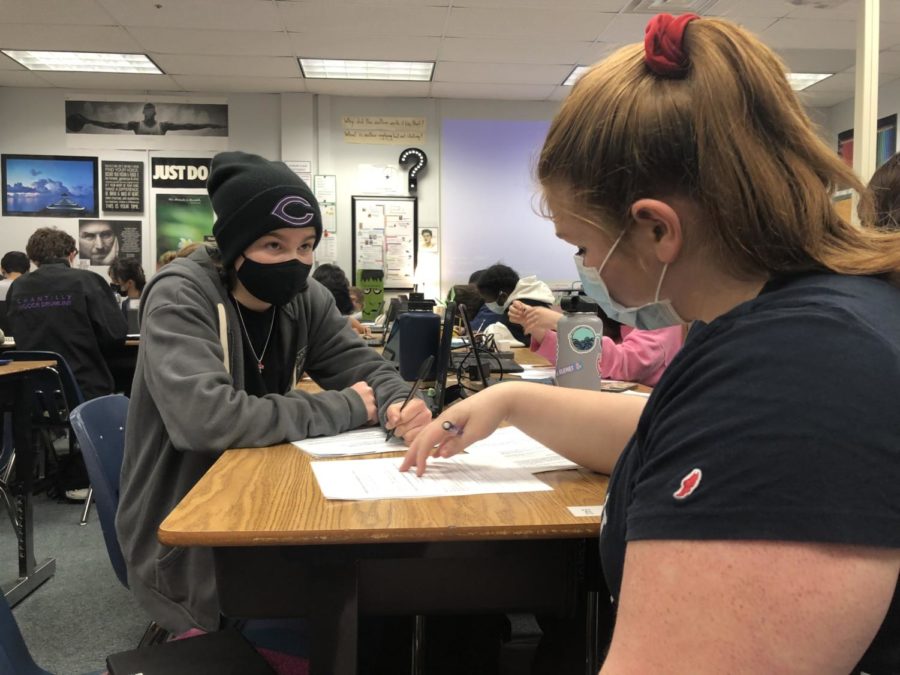Homework cap makes learning more difficult for students
Freshmen Amelia Marsh and Rin Kelly collaborate on homework during LS in their World Civilizations class on March 24.
May 18, 2022
Fairfax County Public Schools (FCPS) has maximum homework limits to mitigate student burnout. FCPS mandates that high school students should not receive more than two hours of homework per night, which is about 30 minutes per class.
“The rationale behind that is to not overload and overburden students with so much work that they lose sleep or don’t have time for other activities,” history teacher Charles Koch said.
Many students have commitments outside of school; sports, clubs and other activities take time out of their afternoons, leaving them to spend late nights finishing hours of homework before an early morning at school.
Sophomore Mira Yeoh spends approximately 13 hours a week at color guard practice. She also plays piano and attends church, leaving her little time for homework.
“Most of my free time is colorguard,” Yeoh said. “I would say that really takes away a lot of time I could use to do homework.”
For Yeoh, excess homework means staying awake until 11 p.m. to midnight finishing four-and-a-half to five hours of homework from her AP World History and other honors classes before waking up at 6:30 a.m.
“I think they found that the amount of homework that was being given in classes was starting to really cause students a lot of stress just on the sheer amount of homework and the time it was taking, hours and hours every night for students,” Koch said.
Some students feel the county’s mandate is too limiting and would prefer more homework than is alloted by FCPS. AP classes, for example, cover college-level content in a high school setting, relying on higher quantities of homework to get through all of the material.
“I feel like 30 minutes is too short,” freshman Mateo Calvo said. “There could be more expansion because some courses need more devotion than others.”
Timed homework could create more problems than it solves. According to Koch, the mandate may lead students to competitively time themselves on how long it takes to complete their homework, drawing unfair conclusions about intelligence when times are compared.
“You can give an assignment, and it could take one person 30 minutes, while it could take another person 45 minutes [and] it could take another person an hour,” Koch said. “Does that make the kid feel not as smart as another kid because one kid says ‘Oh, I did that homework assignment in 20 minutes,’ and the kid who does it in 40 doesn’t feel adequate enough?”
Every individual learns in their own way and pace and according to Koch, it’s important that students refrain from letting the homework cap get in the way of studies.
“The assignment has a purpose, and students should do everything in their power within reason to meet the expectation of what the teacher wants in that assignment, regardless if that takes 30 minutes, 40 minutes or 45 minutes,” Koch said.
Though studying is not an assigned task, many teachers believe that regular, repeated studying is necessary for student success, especially if the lack of homework hurts one’s learning. Teachers like Koch assign less homework than they normally would because of the mandate, but expect students to use this extra time to study for their classes.
“Studying for a test is suggestive,” Koch said. “It’s not required. A student does not have to study for any assessment. It is a suggestion that the teacher makes to the student. Studying is the teacher highly encouraging, highly enfacising, making this suggestion that students need to prep.”
Many students use extra, previously designated homework time to study. Some, like Calvo appreciate the extra opportunity to prepare for tests and quizzes.
“Studying is necessary for me because I have a hard time retaining all of my information from my classes and actually applying it to tests and quizzes,” Calvo said.



